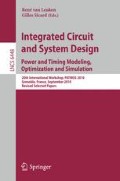Abstract
Process variations cause unpredictability in speed and power characteristics of nanometer CMOS circuits impacting the timing and energy yields. In this paper, transistor reordering and dual-Vth techniques are evaluated regarding their efficiency in mitigating the impact of process variations on a set of pulsed flip-flops. It is shown that the conjunct use of the above mentioned techniques can improve delay, energy and EDP yields more than 1.98X, 1.62X and 1.99X times, respectively. The yield optimized flip-flop circuits are also comparatively analyzed to identify the best topologies.
Access this chapter
Tax calculation will be finalised at checkout
Purchases are for personal use only
Preview
Unable to display preview. Download preview PDF.
References
Wong, B.P., et al.: Nano-CMOS Design For Manufacturability. John Wiley & Sons, Chichester (2009)
Borkar, S., Karnik, T., Narendra, S., Tschanz, J., Keshavarzi, A., De, V.: Parameter variations and impact on circuits and microarchitecture. In: Proc. of the 40th Conference on Design automation, Anaheim, CA, USA, June 2-6 (2003)
Sylvester, D., Agarwal, K., Shah, S.: Variability in nanometer CMOS: Impact, analysis, and minimization, Integration. The VLSI Journal 41(3), 319–339 (2008)
Stojanovic, V., Oklobdzija, V.: Comparative Analysis of Master-Slave Latches and Flip-Flops for High-Performance and Low-Power Systems. IEEE J. Solid-State Circuits 34(4), 536–548 (1999)
Rebaud, B., Belleville, M., Bernard, C., Robert, M., Maurine, P., Azemard, N.: A comparative study of variability impact on static flip-flop timing characteristics. In: Proc. IEEE International Conference on Integrated Circuit Design and Technology ( ICICDT), Austin, TX, June 2-4, pp. 167–170 (2008)
Hansson, M., Alvandpour, A.: Comparative Analysis of Process Variation Impact on Flip-Flop Power-Performance. In: Proceedings of the 2007 IEEE Symposiums on Circuits and Systems (ISCAS 2007), pp. 3744–3747 (2007)
Mostafa, H., Anis, M., Elmasry, M.: Comparative Analysis of Timing Yield Improvement under Process Variations of Flip-Flops Circuits. In: 2009 IEEE Computer Society Annual Symposium on VLSI (2009)
da Silva, D.N., et al.: CMOS Logic Gate Performance Variability Related to Transistor Network Arrangements. Microelectronics Reliability 49, 977–981 (2009)
Ashouei, M., Chatterjec, A., Singh, A.D., De, V.: A dual-Vt layout approach for statistical leakage variability minimization in nanometer CMOS. In: Proceedings of 2005 IEEE International Conference on Computer Design (ICCD), pp. 567–573 (October 2005)
Nedovic, N., Oklobdzija, V.G.: Hybrid Latch Flip-Flop with Improved Power Efficiency. In: Proceedings of the 13th Symposium on Integrated Circuits and Systems Design, pp. 211–215 (2000)
Giacomotto, C., Nedovic, N., Oklobdzija, V.G.: The Effect of the System Specification on the Optimal Selection of Clocked Storage Elements. IEEE J. Solid-State Circuits 42(6), 1392–1403 (2007)
Alioto, M., Consoli, E., Palumbo, G.: General Strategies to Design Nanometer Flip-Flops in the Energy-Delay Space. IEEE Transaction on Circuits and Systems (2009)
Alioto, M., Consoli, E., Palumbo, G.: Flip-Flop Energy/Performance Versus Clock Slope and Impact on the Clock Network Design. IEEE Transaction on Circuits and Systems (2009)
Markovic, D., Nikolic, B., Brodersen, R.: Analysis and Design of Low-Energy Flip-Flops. In: Proc. of the 2001 International Symposium on Low Power Electronics and Design, Huntington Beach, California, United States, pp. 52–55 (2001)
Hossain, R., et al.: Reducing Power Dissipation in CMOS Circuits by Signal Probability Based Transistor Reordering. IEEE Trans. Computer Aided Design Integrated Circuits Systems 15(3), 361–368 (1996)
Li, B., Peh, L., Patra, P.: Impact of Process and Temperature Variations on Network-on-Chip Design Exploration. In: Proc. of the Second ACM/IEEE International Symposium on Networks-on-Chip, NOCS, pp. 117–126 (2008)
Author information
Authors and Affiliations
Editor information
Editors and Affiliations
Rights and permissions
Copyright information
© 2011 Springer-Verlag Berlin Heidelberg
About this paper
Cite this paper
Lanuzza, M., De Rose, R., Frustaci, F., Perri, S., Corsonello, P. (2011). Impact of Process Variations on Pulsed Flip-Flops: Yield Improving Circuit-Level Techniques and Comparative Analysis. In: van Leuken, R., Sicard, G. (eds) Integrated Circuit and System Design. Power and Timing Modeling, Optimization, and Simulation. PATMOS 2010. Lecture Notes in Computer Science, vol 6448. Springer, Berlin, Heidelberg. https://doi.org/10.1007/978-3-642-17752-1_18
Download citation
DOI: https://doi.org/10.1007/978-3-642-17752-1_18
Publisher Name: Springer, Berlin, Heidelberg
Print ISBN: 978-3-642-17751-4
Online ISBN: 978-3-642-17752-1
eBook Packages: Computer ScienceComputer Science (R0)

